
One of our main priorities is to ensure universal access to, and informed use of effective contraception. Millions of people lack the knowledge and information to determine when or whether they have children, and they are unable to protect themselves against sexually transmitted infections (STIs).
Articles about Contraception
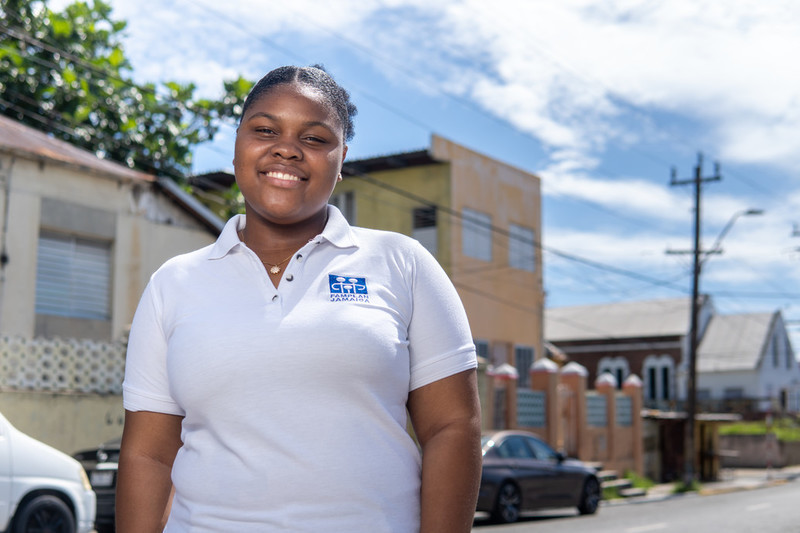
“I wanted to pass on my knowledge”
Candice, 18, joined the Youth Advocacy Movement (YAM) when she was 15 after being introduced to the group by the Jamaica Family Planning Association’s (FAMPLAN) youth officer, Fiona. Sharing knowledge with peers Initially, Candice, saw YAM as a space where she could learn about sexual and reproductive health and rights (SRHR) as there was no information available elsewhere. Candice uses her knowledge and involvement with YAM to educate her peers about their sexual health and rights with hopes that they make informed choices if they choose to engage in sex. “I’ve seen teenagers get pregnant and it’s based off them never knowing routes they could take to prevent pregnancies. I figured I could play a role by learning it for myself, applying it to myself as well as talk to those around me to somewhat enlighten them about sexual and reproductive health. I just wanted to be able to learn for myself and pass on the knowledge.” Making positive changes Candice believes that sexual and reproductive health and rights are not limited to sex, but also about being empowered to make positive changes and choices. Candice has worked with the youth group to use her voice for the voiceless and make a change. “Seeing young girls divert to wanting more and because their parents were not able to provide, they turn to men. Also, I saw undue pressure being placed on girls to not have sex and that pressure unfortunately caused them to develop creative ways to go out and it so ends up that they were left with an unwanted pregnancy. I was learning not only for myself, but to spread the word. I learnt I needed to immerse myself in order to be an effective advocate.” Through her advocacy work, Candice has been to health fairs and spoken to her peers and adults about their sexual and reproductive health and rights. The impact has been positive. “In my circle I’ve seen people become more aware and more careful. In my teaching, my friends are inspired to join so I am looking to recruit soon,” she said. Breaking down barriers to contraception use Candice has faced a number of obstacles, especially around the reservations her peers have to practicing safer sex. “You can only educate someone, but you can’t force them to do what you’re promoting. You will have different people asking and you explain to them and show them different ways to approach stuff and they will outright be like ‘OK, I am still going to do my thing. This is how I am used to my thing’. So, they accept the information, but are they practicing the information? People are open minded, but it’s just for them to put the open mindedness into action.” Candice says there are parents who are not open to discussing these issues with their children and it subsequently makes the work more challenging and prohibits access to safer practices and choices. She believes it would be beneficial for parents to take a more active role in advocating healthy choices. She would also like to see more sexual and reproductive health and rights sessions delivered in schools. “Implement classes in school that are more detailed than what exists. The current lessons are basic and the most compact you’ll learn is the menstrual cycle. You’re learning enough to do your exam, not apply to real life. If this is in schools, the doctors and clinics may be more open to the reality that younger people are engaging in sex. To prevent unplanned pregnancies be more open.” “YAM has good intentions. These good intentions are definitely beneficial to the target audience. With more empowerment in the initiative we can move forward and complete the goal on a larger scale.”
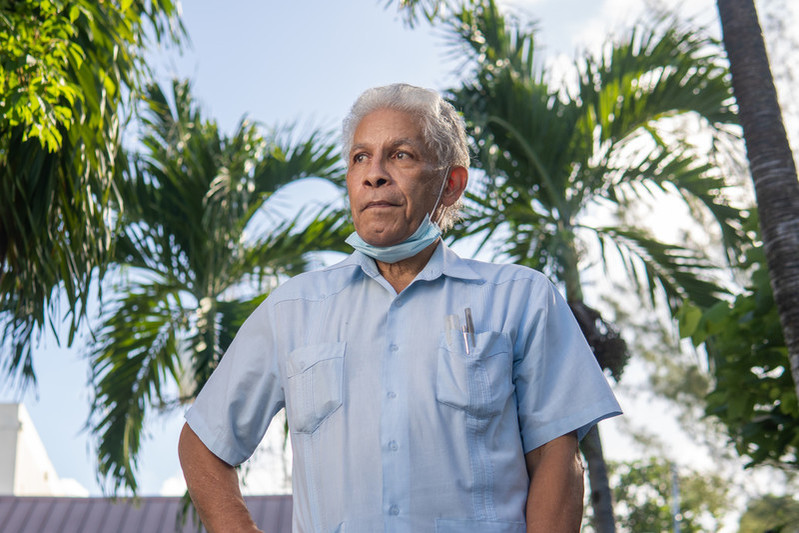
"I saw the opportunity to do cervical screenings"
Dr McKoy has committed his life to ensuring equality of healthcare provision for women and men at the Jamaica Family Planning Association (FAMPLAN). Expanding contraceptive choice Returning to Jamaica from his overseas medical studies in the 1980s, Dr McKoy was frustrated and concerned at the failure of many Jamaican males to use contraception. This led him to making a strong case to integrate male sterilization as part of FAMPLAN’s contraceptive care package. Whilst the initial response from local males was disheartening, Dr McKoy took the grassroots approach to get the buy-in of males to consider contraception use. “Someone once said it’s only by varied reiteration that unfamiliar truths can be introduced to reluctant minds. We used to go out into the countryside and give talks. In those times I came down heavily on men.” Overcoming these barriers, was the catalyst he needed to ensure that men accessed and benefitted from health and contraceptive care. Men were starting to choose vasectomies if they already had children and had no plans for more. Encouraging uptake of male healthcare Dr McKoy was an instrumental voice in the Men’s Clinic that was run by FAMPLAN, encouraging the inclusion of women at the meetings, in order to increase male participation and uptake of healthcare. “When we as men get sick with our prostate it is women who are going to look after us. But we have to put interest in our own self to offset it before it puts us in that situation where we can’t help yourself. It came down to that and the males eventually started coming. The health education got out and men started being more confident in the health services.” Health and wellbeing are vital McKoy advocates the importance of women taking their sexual health seriously and accessing contraceptive care. If neglected, Dr McKoy says it could be a matter of life death. He recalls a story of a young mother who was complacent towards cervical screenings and sadly died from cervical cancer - a death he says which could have been prevented. “Over the years I saw the opportunity to do cervical screenings at the clinic. The mobile unit gave us access to so many patients. We had persons who neglected to do it. One patient in particular - she was not yet 30 years old. She had three children and after every delivery she was told by the hospital to get a cervical screening. She didn’t do it and eventually got cervical cancer. When she was to do the cervical screening, she didn’t come. One morning they brought her and had to lift her up out of the car. At that time doctors said they couldn’t do anything for her. It wasn’t necessary. So, we had to go out more to meet people, educate them teach them the importance of sexual and reproductive health.” That experience was his driving force to continue the work in providing sexual and reproductive healthcare and information through community outreach.
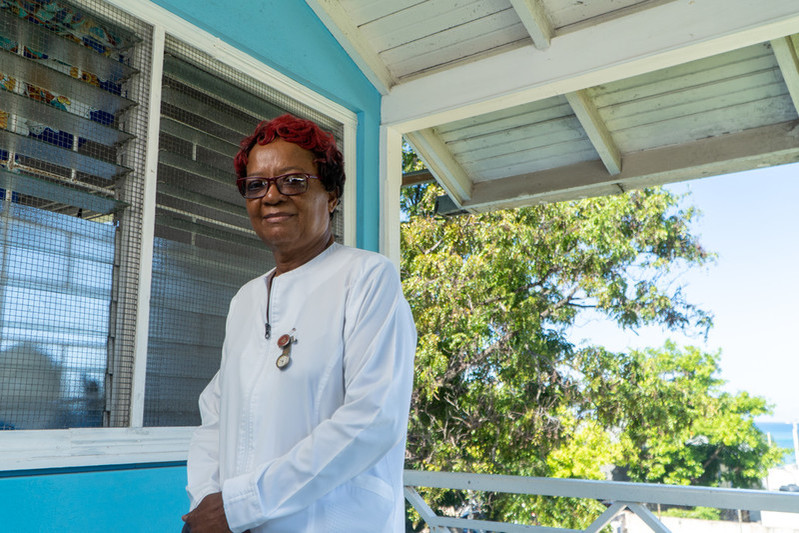
“FAMPLAN has made its mark”
Cultural barriers and stigma have threatened the work of the Jamaica Family Planning Association (FAMPLAN), but according to one senior healthcare provider at the Beth Jacobs Clinic in St Ann, Jamaica things have taken a positive turn, though some myths around contraceptive care seem to prevail. Committed to changing perceptions and attitudes Midwife, Dorothy, is head of maternal and child and sexual and reproductive healthcare at the Beth Jacobs Clinic and first began working with FAMPLAN in 1973. She says the organization has made its mark and reduced barriers and stigmatizing behaviour towards sexual health and contraceptive care. Cultural barriers were once often seen in families not equipped with basic knowledge about sexual health. “I remember some time ago a lady beat her daughter the first time she had her period as she believed the only way, she could see her period, is if a man had gone there [if the child was sexually active]. I had to send for her [mother] and have a session with both her and the child as to how a period works. She apologized to her daughter and said she was sorry. She never had the knowledge and she was happy for places like these where she could come and learn – both parent and child.” Working with religious groups to overcome stigma Religious groups once perpetuated stigma, so much so that women feared even walking near the FAMPLAN property. “Church women would hide and come, tell their husbands, partners or friend they are going to the doctor as they have a pain in their foot, which nuh guh suh [was not true]. Every minute you would see them looking to see if any church brother or sister came on the premises to see them as they would go back and tell the Minister because they don’t support family planning. But that was in the 90s.” Dorothy says that this has changed, and the church now participates in training sessions sexual healthcare and contraceptive choice, encouraging members to be informed about their wellbeing and reproductive rights. Navigating prevailing myths Yet despite the wealth of information and forward thinking of the communities the Beth Jacobs Clinic reaches, Dorothy says there are some prevailing myths, which if left unaddressed threaten to repeal the work of FAMPLAN. “Information sharing is important, and we try to have brochures on STIs, and issues around sexual and reproductive health and rights. But there are people who still believe sex with a virgin cures’ HIV, plus there are myths around contraceptive use too. We encourage reading. Back in the 70s, 80s, 90s we had a good library where we encouraged people to read, get books, get brochures. That is not so much now,” Dorothy says. Another challenge is ensuring women are consistent with accessing healthcare and contraception. “I saw a lady in the market who told me from the last day I did her pap smear she hasn’t done another one. That was five years ago. I had one recently - no pap smear for 14 years. I delivered her last child,” she says. Despite these challenges Dorothy remains dedicated and committed to her community knowing her work helps to improve women’s lives through choice. She is confident that the Mobile Unit with community-based distributors will be reintegrated into FAMPLAN healthcare delivery so that they can reach remote communities. “FAMPLAN has made its mark. It will never leave Jamaica or die.”
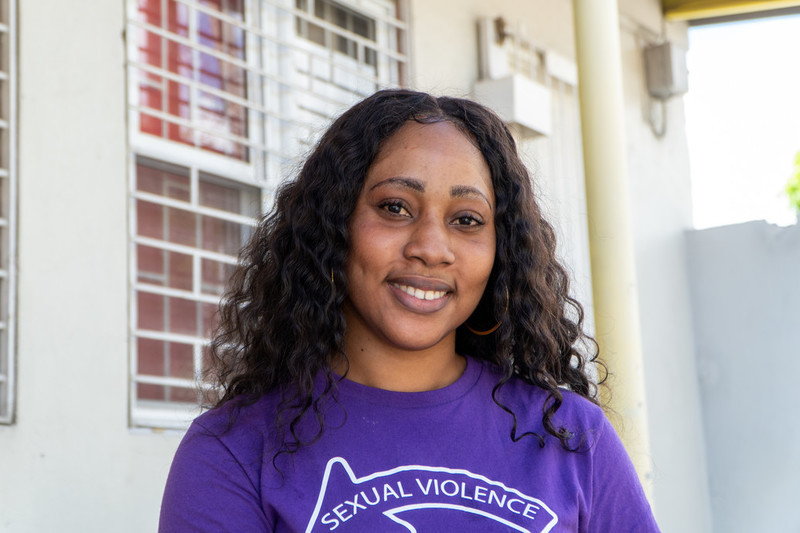
“This group is very dear to me”
Christan, 26, is committed to helping develop young people to become confident advocates for change. Christan is the executive assistant at the FAMPLAN Lenworth Jacobs Clinic. Her work overlaps with that of the Youth Action Movement (YAM), helping to foster the transitioning and development of youth into meaningful adults. Harnessing change through young advocates “FAMPLAN provides the space or capacity for young persons who they engage on a regular basis to grow — whether through outreach, rap sessions, educational sessions. The organization provides them with an opportunity to grow and build their capacity as it relates to advocating for sexual and reproductive health and rights amongst their other peers,” she said. Though she has passed on her youth officer baton, Christan, remains connected to YAM and ensures she leads by example. “When you have young adults, who are part of the organization, who lobby and advocate for the rights of other adults like themselves, then, on the other hand, you are going to have young people like Mario, Candice and Fiona who advocate for persons within their age cohort,” she said. “Transitioning out of the group and working alongside these young folks, I feel as if I can still share some of the realities they share, have one-on-one conversations with them, help them along their journey and also help myself as well, because social connectiveness is an important part of your mental health. This group is very, very, very dear to me.” Gaining confidence through volunteering With regards to its impact on her life, Christan said YAM helped her to become more of an extrovert and shaped her confidence. “I was more of an introvert and now I can get up do a wide presentation and engage other people without feeling like I do not have the capacity or expertise to bring across certain issues,” she said. However, she says that there is still a lot of sensitivity around sexual and reproductive health and rights. This can sometimes limit the conversations YAM is able to have and at times may generate fear among some of the group members. Turning members into advocates “There are certain sensitive topics that still present an issue when trying to bring it forward in certain spaces. Other challenges they [YAM members] may face are personal reservations. Although we provide them with the skillset, certain persons are still more reserved and are not able to be engaged in certain spaces. Sometimes they just want to stay in the back and issue flyers or something behind the scenes rather than being upfront.” But as the main aim of the movement is to develop advocates out of members, Christan’s conviction is helping to strengthen Yam's capacity. “To advocate you must be able to get up, stand up and speak for the persons who we classify as the voiceless or persons who are vulnerable and marginalised. I think that is one of the limitations as well. Going out and doing an HIV test and having counselling is OK, but as it relates to really standing up and advocating, being able to write a piece and send it to Parliament, being able to make certain submissions like editorial pieces. That needs to be strengthened,” says Christan.
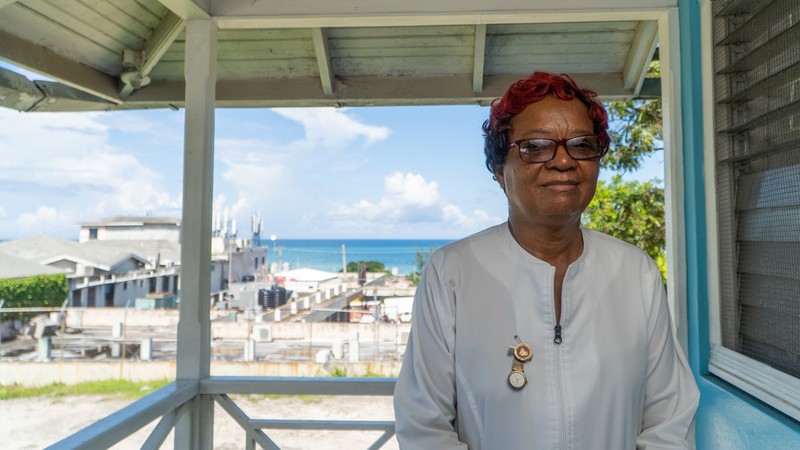
81 years of dedicated healthcare to Jamaica’s communities
The Family Planning Association of Jamaica (FAMPLAN) has been a lead provider of sexual and reproductive healthcare to communities across Jamaica for 81 years. Over the years, FAMPLAN’s healthcare provision within the community has grown along with partnerships with other organizations resulting in improved access to, and increased uptake of, screening for cervical, breast, and prostate cancers. In addition, FAMPLAN has successfully expanded testing and treatment for sexually transmitted infections. FAMPLAN has developed and grown a successful Youth Action Movement (YAM), which works with young people in local communities. The YAM provides access to information and contraceptive care as well as reaching young people with education sessions about health, wellbeing, and sexual rights. Volunteering in the 1970’s FAMPLAN boasts a committed team of dedicated staff including Dorothy, a midwife, and Dr McKoy. “I came on to FAMPLAN in 1973 as a volunteer. I was the nurse in charge of maternal and child health at the St Ann’s Bay Health Centre. I got very interested because at the time they had a vibrant youth programme where you would go to schools, churches, other organizations and encourage persons to use contraceptives and other services that we offer like tubal ligation, vasectomy and other things. I wanted to know what this organization was about, so I served as a volunteer until 1977,” recalls Dorothy. Dorothy has worked at FAMPLAN in different roles over the years, including lead nurse for maternal and child healthcare and sexual and reproductive healthcare. She recently returned to FAMPLAN in 2017. Dorothy is proud to see FAMPLAN develop and offer sexual health and contraceptive care to over 100 rural communities and hard to reach populations in and around St Ann. “It’s how you were able as a nurse to help others. You had a Mobile Unit and trust me I enjoyed the mobile unit, going up into the hills,” she says. Continuing provision of integrated healthcare Dr Stewart McKoy has ensured that the efforts to increase public awareness on sexual and reproductive healthcare and rights remain at the forefront of FAMPLAN’s mission. Yet, one challenge FAMPLAN faced has been to overcome barries to contraceptive use by men. This led him to making a strong case to integrate male sterilization as part of FAMPLAN’s contraceptive care package. Whilst the initial response from local males was disheartening, Dr McKoy took the grassroots approach to get the buy-in of males to consider contraception use. Overcoming these barriers, was the catalyst he needed to ensure that men accessed and benefitted from health and contraceptive care. Men were starting to choose vasectomies if they already had children and had no plans for more. Dr McKoy is proud of his work and FAMPLAN’s achievements. “When I drive in here my thoughts are that I’m home.” Providing a safe space to young communities FAMPLAN's Youth Action Movement (YAM) has provided a safe space for many young people to discuss issues like sexual consent, sexual health and rights, sexuality, and provide them with accurate information and access to health and contraceptive care. YAM’s impact goes beyond sexual and reproductive health, as the group has supported many young people on issues of self-harm and depression. FAMPLAN's Youth Officer, Fiona, says, “There’s a lot going through these teenagers’ minds. Through YAM I have developed relationships and become their confidante, so they can call me for anything. The movement is impacting. It helped me with my life and now I can pass it down. YAM can go a far way with the right persons. Whatever we do we do it with fun and education – edutainment.”
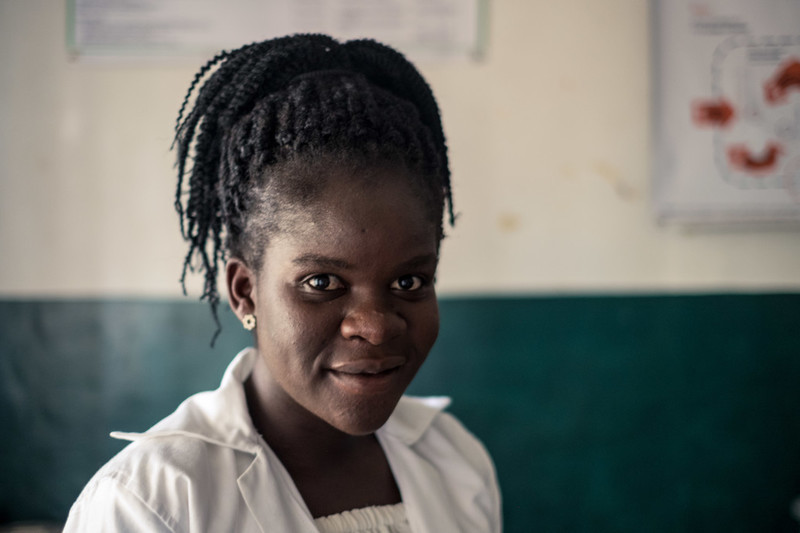
“Most NGOs don’t come here because it’s so hard to reach”
Dressed in a sparkling white medical coat, Alinafe runs one of Family Planning Association of Malawi (FPAM) mobile clinics in the village of Chigude. Under the hot midday sun, she patiently answering the questions of staff, volunteers and clients - all while heavily pregnant herself. Delivering care to remote communities “Most NGOs don’t come here because it’s so hard to reach,” she says, as women queue up in neat lines in front of two khaki tents to receive anything from a cervical cancer screening to abortion counselling. Without the mobile clinic, local women risk life-threatening health issues as a result of unsafe abortion or illnesses linked to undiagnosed HIV status. According to the Guttmacher Institute, complications from abortion are the cause of 6–18% of maternal deaths in Malawi. District Manager Alinafe joined the Family Planning Association of Malawi in 2016, when she was just 20 years old, after going to nursing school and getting her degree in public health. She was one of the team involved in the Linkages project, which provided free family planning care to sex workers in Mzuzu until it was discontinued following the 2017 Global Gag Rule. Seeing the impact of lost funding on care “This change has reduced our reach,” Alinafe says, explaining that before the Gag Rule they were reaching sex workers in all four traditional authorities in Mzimba North - now they mostly work in just one. She says this means they are “denying people services which are very important” and without reaching people with sexual and reproductive healthcare, increasing the risk of STIs. The reduction in healthcare has also led to a breakdown in the trust FPAM had worked to build in communities, gaining support from those in respected positions such as chiefs. “Important people in the communities have been complaining to us, saying why did you do this? You were here, these things were happening and our people were benefiting a lot but now nothing is good at all,” explains Alinafe. Still, she is determined to serve her community against the odds - running the outreach clinic funded by Global Affairs Canada five times a week, in four traditional authorities, as well as the FPAM Youth Life Centre in Mzuzu. “On a serious note, unsafe abortions are happening in this area at a very high rate,” says Alinafe at the FPAM clinic in Chigude. “Talking about abortions is a very important thing. Whether we like it or not, on-the-ground these things are really happening, so we can’t ignore them.”
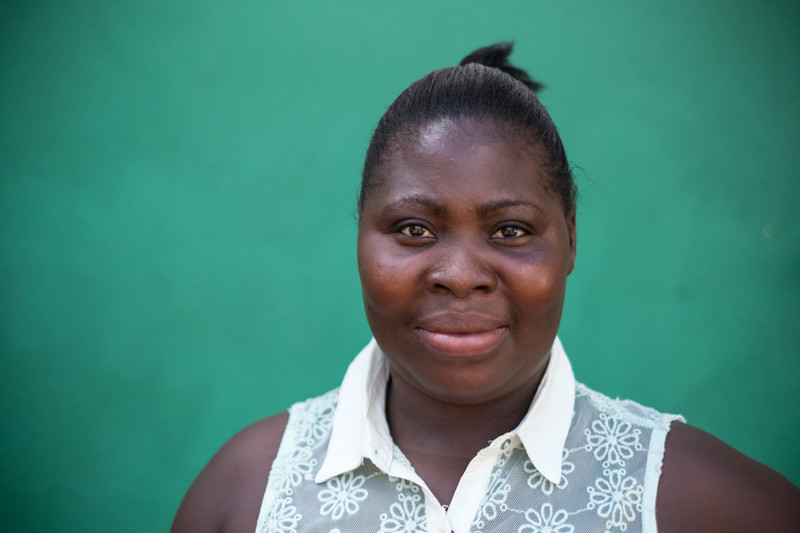
“I learnt about condoms and even female condoms"
Mary, a 30-year-old sex worker, happily drinks a beer at one of the bars she works at in downtown Lilongwe. Her grin is reflected in the entirely mirrored walls, lit with red and blue neon lights. Above her, a DJ sat in an elevated booth is playing pumping dancehall while a handful of people around the bar nod and dance along to the music. It’s not even midday yet. Mary got introduced to the Family Planning Association of Malawi through friends, who invited her to a training session for sex worker ‘peer educators’ on issues related to sexual and reproductive health and rights as part of the Linkages project. “I learnt about condoms and even female condoms, which I hadn’t heard of before,” remembers Mary. Life-changing care and support But the most life-changing care she received was an HIV test, where she learnt that she was positive and began anti-retroviral treatment (ART). “It was hard for me at first, but then I realized I had to start a new life,” says Mary, saying this included being open with her son about her status, who was 15 at the time. According to UNAIDS 2018 data, 9.2% of adult Malawians are living with HIV. Women and sex workers are disproportionately affected - the same year, 55% of sex workers were estimated to be living with HIV. Mary says she now feels much healthier and is open with her friends in the sex worker community about her status, also encouraging them to get tested for HIV. “Linkages brought us all closer together as we became open about these issues with each other,” remembers Mary. Looking out for other sex workers As a peer educator, Mary became a go-to person for other sex workers to turn to in cases of sexual assault. “I’ll receive a message from someone who has been assaulted, then call everyone together to discuss the issue, and we’d escort that person to report to police,” says Mary. During the Linkages project - which was impacted by the Global Gag Rule and abruptly discontinued in 2017 - Mary was given an allowance to travel to different ‘hotspot’ areas. In these bars and lodges, she explains in detail how she would go from room-to-room handing out male and female condoms and showing her peers how to use them. FPAM healthcare teams would also go directly to the hotspots reaching women with healthcare such as STI testing and abortion counselling. FPAM’s teams know how crucial it is to provide healthcare to their clients ensuring it is non-judgmental and confidential. This is a vital service: Mary says she has had four sex worker friends die as a result of unsafe abortions, and lack of knowledge about post-abortion care. “Since the project ended, most of us find it difficult to access these services,” says Mary, adding that “New sex workers don’t have the information I have, and without Linkages we’re not able to reach all the hotspot bars in Lilongwe to educate them.”
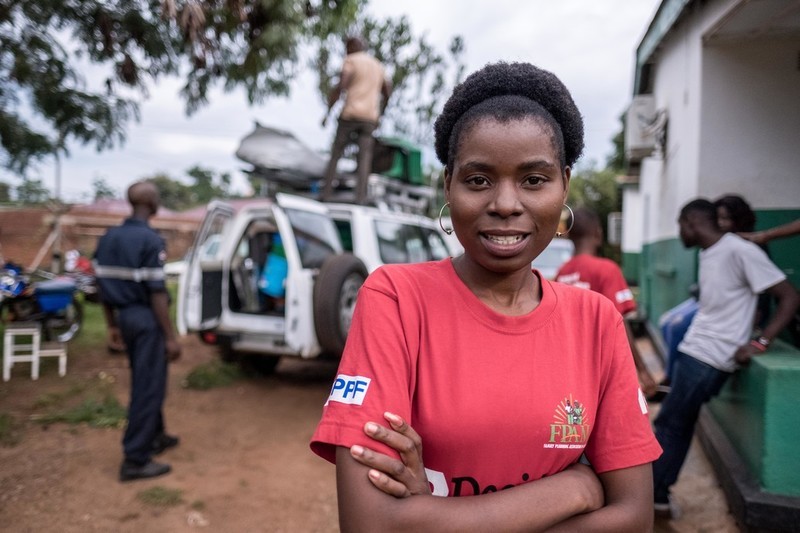
Young volunteers connect their peers to information and contraceptive care
In Chigude, a usually quiet rural village in northern Malawi, young people gather around two tables laughing and chatting animatedly. On one table, they are playing a traditional mancala board game Bawo. On the other, volunteers demonstrate putting a condom onto a wooden model penis. Though this is inevitably met with shouts and giggles, the largely male crowd watches intently. “Most of them have come here for condoms, but I don’t just give them out,” says Kondwani, a 22-year-old Youth Action Movement (YAM) volunteer. “I ask them how do you use a condom? How is it useful to somebody who is using it?” Committed to sharing knowledge with their peers Activities like this in hard-to-reach areas are one of many that the Youth Action Movement delivers across Malawi. Trained and hosted by Youth Life Centres, which provide sexual and reproductive healthcare aimed at youth, the volunteers meet regularly and reach out to their peers in schools, universities, and on social media. Phoebe, 22, is a YAM volunteer in Malawi’s capital, Lilongwe. “It’s hard for girls to speak out about sexual abuse because they fear the community will talk about them and blame them,” she explains, adding that a particular fear of being thrown out of their homes after opening up to their parents is one reason why girls are more comfortable opening up to their peers. This is why trained volunteers like Phoebe are often approached by other young women who have been sexually assaulted. “When this happens, I speak to other YAM members about it and we decide what advice to give,” she says. This will usually involve giving advice and sometimes going with young people to their local Youth Life Centre for STI testing and abortion counselling, as well as the hospital and the police, depending on the case. “I tell girls they can decide what to do about their lives, their future and their bodies,” says Phoebe proudly, hanging out with her friends from YAM at Lilongwe Youth Life Centre. Offering a range of care for youth communities Chipiliro, the District Manager for Lilongwe, says that the centre focuses mainly on youth, as well as women and under-served communities. Their healthcare is integrated, meaning that “when a client comes in this room for one condition, they should also be able to claim our other services,” says Chipiliro. He explains that this helps to “reduce stigma” as a client who is at the Youth Life Centre for one reason, for example to pick up condoms, can also then be offered other care that they might be less confident to ask for such as STI testing or abortion counselling. Also, at the centre is Fane, a 33-year-old mother of three who has come to get the contraceptive pill. “I had the injection before but it had some bad side effects, so I wanted to change,” she explains. Before Fane moved to Lilongwe, she says she had little understanding about contraceptive options and healthcare was difficult for her to reach from her remote village. When she learned more about the different contraceptive methods available to her, she discussed them with her husband and has been using them ever since. “Family planning is very important because it relieves the anxiety I used to have before,” says Fane, remembering she used to avoid having sex with her husband for fear of getting pregnant. “Now, I don’t have those anxieties and we’re having sex again like we used to!” She smiles, adding that the other major benefit of contraception has been spacing the ages of her children well. “This means I’m able to focus on my business selling mandazi (local donuts) and tomatoes.”
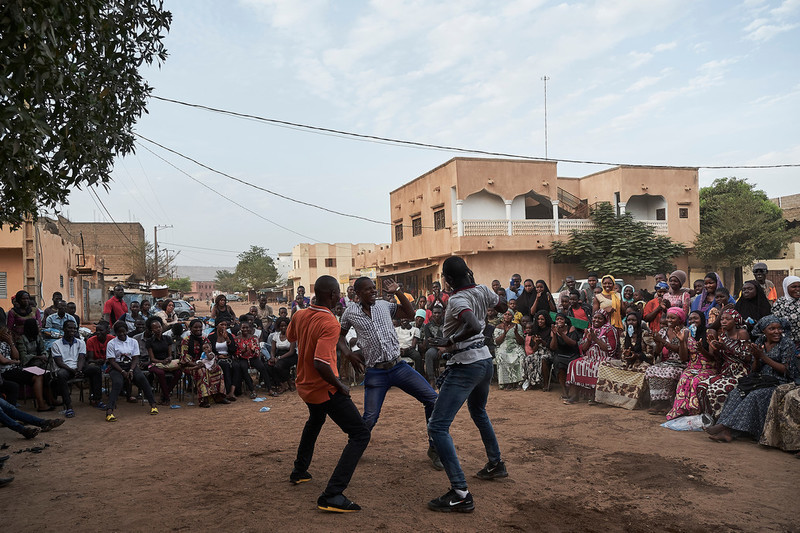
Using street dance to teach about consent, contraception and more
Abdoulaye Camara is the best dancer in the neighbourhood, and he’s not afraid to show it. Abdoulaye grooves to the beat blaring from hastily assembled speakers, accompanied by two friends who follow his lead in a slickly choreographed routine. He soon gathers a crowd outside a cafe in Commune IV, a working class area of Mali’s capital, Bamako. Young men who spend the day mining for gold are trudging home, and stop to take a look. Girls holding younger siblings by the hand sidle up to the crowd, which is growing in size with every new track. "We distract them with dance and humor" Abdoulaye’s moves are not just for fun. He is head of the dance troupe of the Youth Action Movement, belonging to the Association Malienne pour la Protection et la Promotion de la Famille (AMPPF), which uses dance and comedy sketches to talk about sex. It’s a canny way to deliver messages about everything from using condoms to taking counterfeit antibiotics, to an audience who are often confused and ashamed about such topics. “We distract them with dance and humor and then we transmit those important messages about sex without offending them,” explained Abdoulaye. “We show them that it’s not to insult them or show them up, but just to explain how these things happen.” The average Malian woman will give birth to six children, according to the World Bank, one of the highest fertility rates in the world. In the closely packed streets of Commune IV, teenagers hear whispers about pregnancy and sexually transmitted infections, but are scared to ask more. Everyone knows everyone else’s business. “Young people don’t like us to talk too directly to them about sex or sexually transmitted infections. We can’t also speak frankly about early pregnancy either,” Abdoulaye said. “They will tell us ‘I know all about this’ but then we see more girls pregnant and more infections, so it’s not true.” For five years now, Abdoulaye and his loyal band of dancers have staged street shows in schools, streets and cafes. In a recent sketch he played a bisexual man conducting a relationship with a man and a woman simultaneously, only to have to warn them both he had a sexually transmitted infection. The three young actors played for laughs, making light of a scenario that is highly taboo in Mali. Meeting unmet needs The centrepiece of all the dances and sketches is the use of contraception, and hints at what safe, consensual sex might look like. In Mali, a quarter of women have an unmet need for contraception, leading to an estimated 418,000 unwanted pregnancies a year. Abdoulaye and his team speak in the local language, Bambara, and ask the audience about their preconceptions about using condoms or getting a contraceptive implant. The majority of the audience is illiterate, and with no books, internet or schoolteachers, they lack reliable sources of information on preventing pregnancies or spacing children. Oumou Konaté, 25, was watching from the sidelines with a smile on her face. She became a mother while still in her teens, and began using an implant after the birth of her daughter. “I came here because I like the activities and what they are doing. I wanted to know more about family planning and condoms. I really appreciated what they showed us,” Oumou said. “I got the information that I wanted, lots of things I didn’t know before.” As the sun sets over the hills behind Commune IV, the music dies down and Abdoulaye helps to pack up the troupe’s props and equipment. “We want to reach everyone in Bamako and across Mali. We are the first but I hope we aren’t the last,” he said.
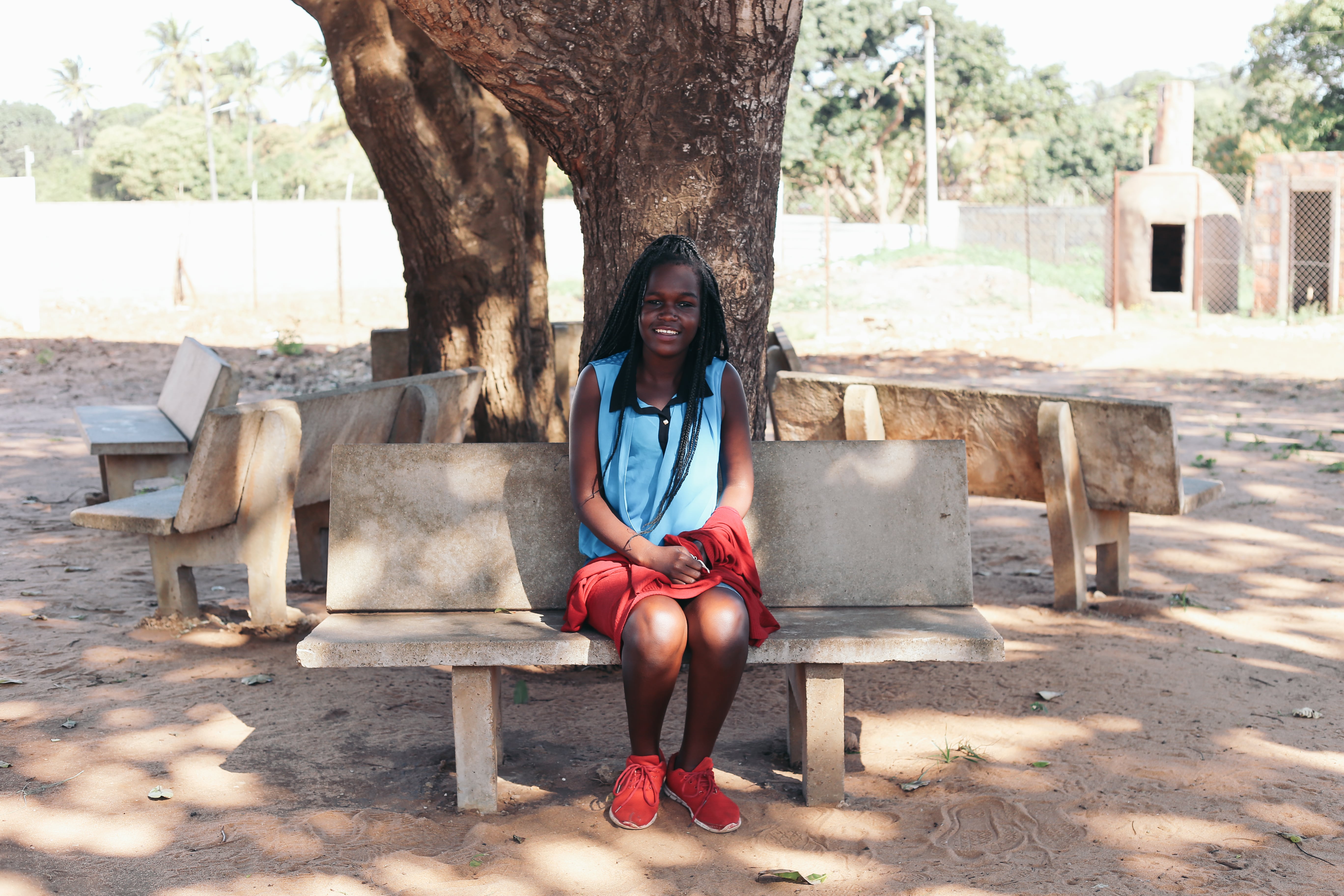
"Being a single mother at 14 was a suffocating experience and it could have been worse if I hadn't been accompanied by the Adolescent and Youth Friendly Services"
Five years ago, when Arnilda Simango was 13, she started dating a boy from her community, outside Xai-Xai City, in Gaza Province in southern Mozambique. A year later she got pregnant, at his insistence, and he left her shortly after the baby was born. AMODEFA’s youth services offered her counselling and advice throughout her pregnancy and became the network through which she made new friends. Today, at the age of 18, she is raising her son, with help from her mother and plans to return to school. “When I started dating, I thought I wanted a partner who could take care of me and that could maybe fill the void I felt for not having a father. When I started the relationship with my boyfriend, he insisted that he needed a son because all his friends already had one. I had little space to say no because he threatened to date someone else and I was convinced he was the right person for me. When I got pregnant in 2016, he started behaving strangely. He stopped being affectionate and gave indications that he did not want to be with me anymore. That's when a friend of mine told me that there was a youth center where I could get advice on how to proceed in this situation". The Adolescent and Youth Friendly Services (SAAJ) center, based at the Patrice Lumumba Urban Health Center, on the outskirts of Xai-Xai, is run by AMODEFA and provides HIV testing and treatment, prenatal and postpartum consultations, and other information and services around sexual health and rights. The center is supported by the Women’s Integrated Sexual Health (WISH2ACTION) programme, led by IPPF. "One day I walked there and received a lot of advice. As I was already 4 to 5 months pregnant, I was advised to open a prenatal form. They did all the follow-up until I gave birth to my son.” "Believe me, being a single mother at 14 was a suffocating experience and it could have been worse if I had not been accompanied by [the SAAJ]. I do not know how to thank them. I practically felt alone without knowing what to do, but I had a lot of advice here and made friends with other girls". Planning for the future Arnilda dropped out of 7th grade once she became pregnant and helped her mother selling basic goods from a stall in her home. It is from this small business that her mother supports her two children who are still living at home, as well as five grandchildren. Arnilda plans to return to school next year to continue her studies now her son is old enough to stay with his grandmother. Her dream is to be a professional model. Until then she does not want to have another child, so she goes to the SAAJ for family planning purposes. Arnilda says she walks 50 minutes to the center every three months for the contraceptive injection. "I wanted the implant, but it doesn't settle well with me, so I renew the injection every three months. I do this because I need to continue studying to have a decent job that allows me to support my son. Next year I will go back to school. "A second child is not in the plans. I still consider myself a minor. Even the first child I only had because at the time I had no one to give me advice and show me the best way. I believed in my ex-boyfriend and today I have this lesson. Today I can say that I have come to my senses, not only from the experience of being a mother, but from everything I learn here [at the SAAJ]. There is no friend of mine who does not know SAAJ. I always advise them to approach here because I know they will have all kinds of counselling and accompaniment.”
Pagination
- Previous page
- Page 3
- Next page






